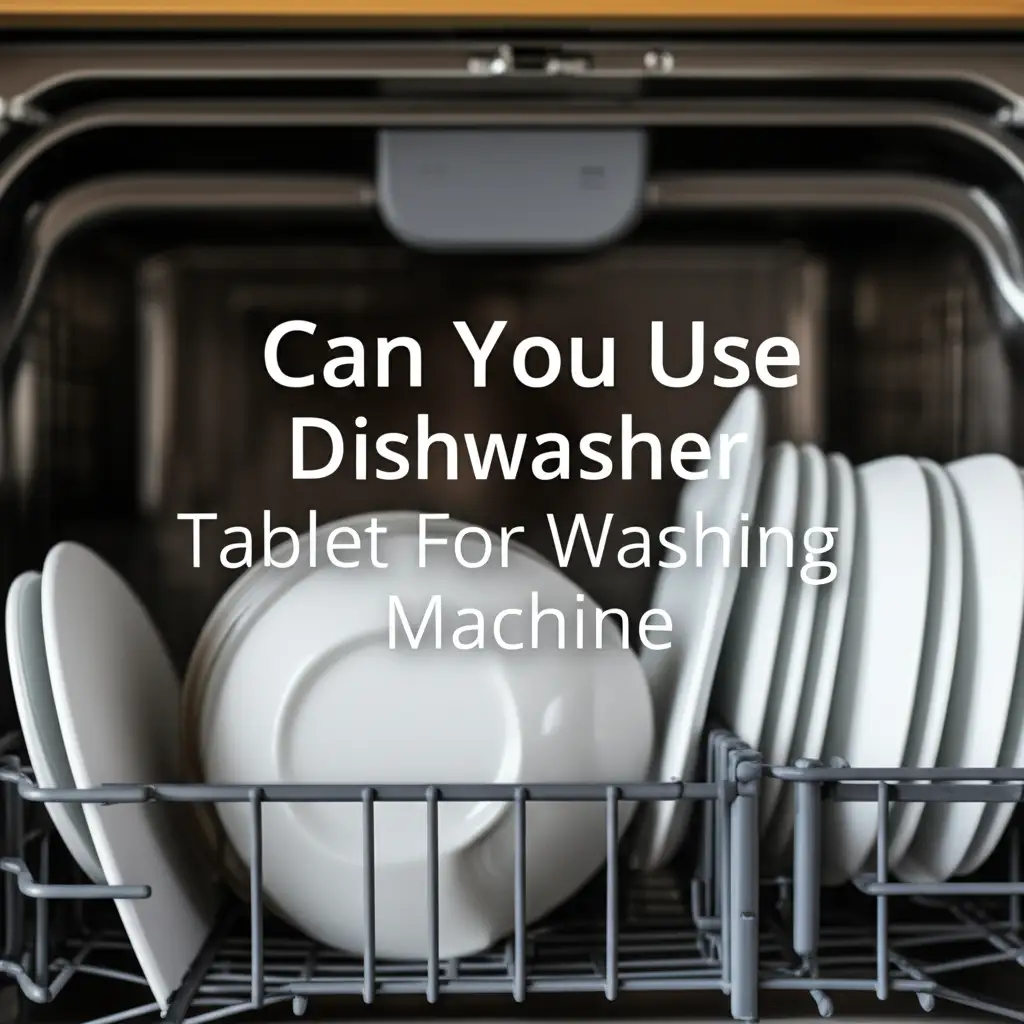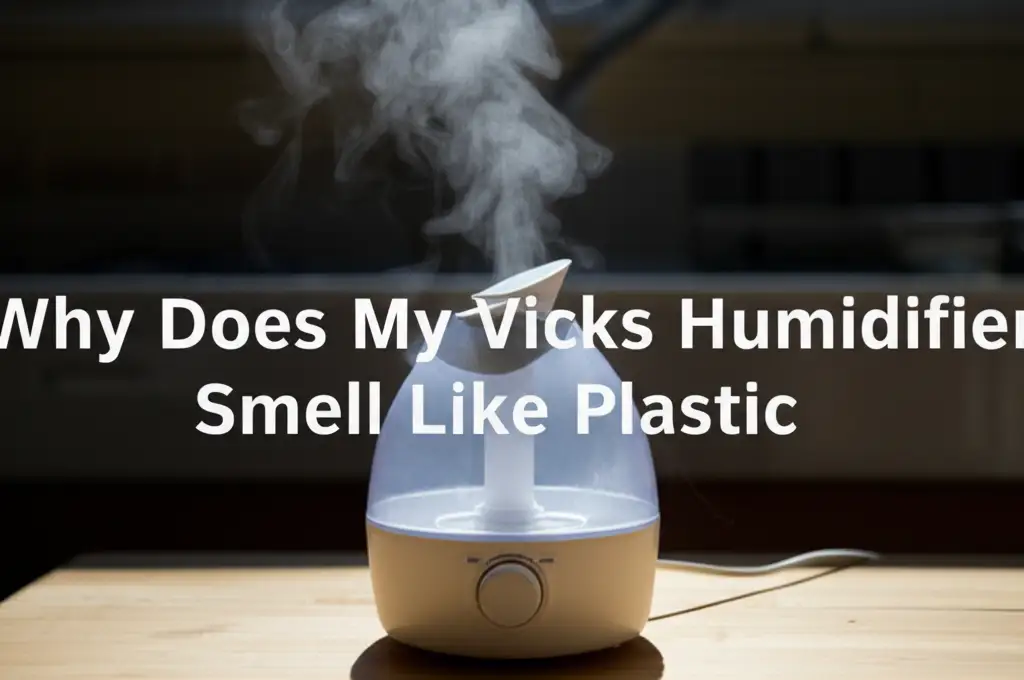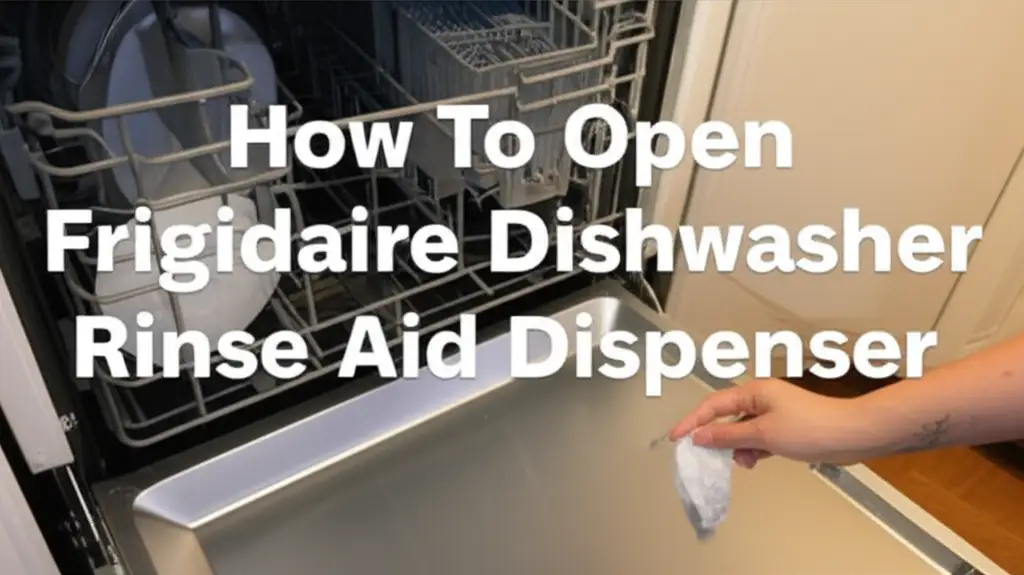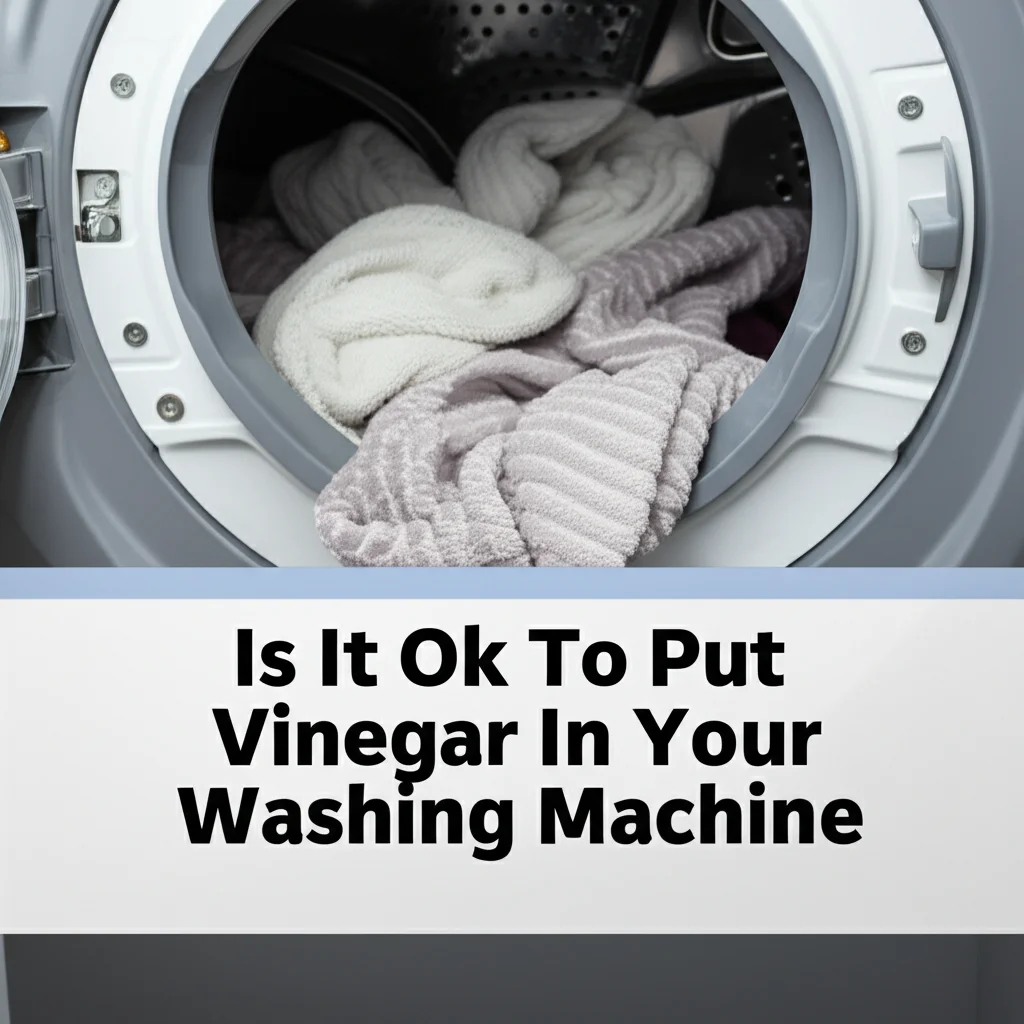· Katria Melrose · Home Appliance Care · 18 min read
Can You Use Dishwasher Tablet For Washing Machine

Can You Use Dishwasher Tablets for Your Washing Machine? The Truth Revealed
We all look for clever shortcuts to simplify household chores. Sometimes, these shortcuts involve using products for purposes other than their original design. A common question I hear is whether a dishwasher tablet can substitute for laundry detergent or be used to clean a washing machine. This idea might stem from seeing how powerful these small tablets are in cleaning dishes.
Dishwasher tablets are potent cleaning agents. They effectively tackle grease and grime on your plates and cutlery. However, their specific chemical makeup is optimized for dishwashing environments. Laundry detergents, on the other hand, are formulated for fabrics and washing machines. This article will explore the practicality and safety of using a dishwasher tablet for washing machine applications. We will examine the differences between these cleaning products, discuss the potential risks, and explain how dishwasher tablets can be used specifically for cleaning the washing machine itself. My goal is to provide clear, actionable advice to keep your appliances running well and your laundry clean.
Takeaway:
- Avoid using dishwasher tablets for washing clothes. Their harsh chemicals can damage fabrics and leave residue.
- Dishwasher tablets can be effective for cleaning the washing machine. They help remove soap scum and hard water deposits.
- Always use dedicated laundry detergent for clothes.
- Regularly clean your washing machine using appropriate methods for optimal performance.
No, you generally should not use a dishwasher tablet for washing clothes in your washing machine. Dishwasher tablets are too harsh for fabrics and can damage your laundry. However, you can safely use a dishwasher tablet to clean the interior of an empty washing machine, helping to remove buildup and odors.
Understanding Dishwasher Tablets Versus Laundry Detergent
Many people wonder if they can use a dishwasher tablet for washing machine clothes. It is important to understand the fundamental differences between these two cleaning products. Dishwasher tablets and laundry detergents are formulated for entirely different purposes. Their chemical compositions reflect these distinct applications.
Dishwasher tablets contain highly concentrated cleaning agents. These agents include strong enzymes, powerful bleach, and aggressive degreasers. They also often feature anti-spotting agents and rinse aids. Dishwasher tablets are designed to tackle baked-on food, grease, and hard water stains on non-porous surfaces like ceramics and glass. A key characteristic is their low-sudsing formula. High suds would overflow a dishwasher. These tablets dissolve in very hot water, releasing powerful chemicals for intense cleaning. For example, why put dishwasher tablet in bottom of machine helps them dissolve quickly and spread agents effectively.
Laundry detergents, conversely, are specifically engineered for fabrics. They contain enzymes tailored to break down common laundry stains like dirt, grass, and food. Laundry detergents also include surfactants that lift dirt from fibers without damaging them. Unlike dishwasher tablets, they are formulated to produce a controlled amount of suds. This suds level helps lubricate clothes during agitation and ensures proper rinsing. They also often contain brighteners, fabric softeners, or color-safe bleaches designed to protect and enhance fabrics. Using the right detergent is crucial for maintaining the quality and longevity of your clothes.
The environments in which these products operate are also different. Dishwashers typically run at higher temperatures and use forceful water jets. Washing machines use tumbling or agitation, and water temperatures vary based on fabric type. Using a product designed for one environment in another can lead to undesirable outcomes. Understanding these differences helps explain why a dishwasher tablet is not suitable for washing your clothes.
The Risks of Using Dishwasher Tablets for Laundry
Using a dishwasher tablet for washing machine laundry can lead to several problems. These problems affect both your clothes and your appliance. I strongly advise against this practice due to the inherent risks. The harshness of dishwasher tablets is simply not compatible with fabrics.
First, fabric damage is a significant concern. Dishwasher tablets contain strong chemicals like potent enzymes, bleach, and highly alkaline cleaning agents. These substances are designed to strip food residues and grease from hard surfaces. They are far too aggressive for delicate fabric fibers. Using them can cause irreversible damage to your clothes. This damage might include fading colors, weakening fabric integrity, or even creating holes. Imagine washing your favorite shirt with a degreaser; that is essentially what you are doing.
Second, residue on clothes is a common issue. Dishwasher tablets are low-sudsing. This property is great for dishwashers, but not for washing clothes. Laundry detergents create suds that help carry away dirt and ensure thorough rinsing. A low-sudsing product might not rinse out completely from fabric. This can leave behind chemical residues on your clothes. Such residues can make fabrics feel stiff or scratchy. More importantly, they can cause skin irritation or allergic reactions for people with sensitive skin. My own experience tells me residual chemicals on clothing are uncomfortable.
Third, potential machine damage is a risk over time. The high alkalinity and strong chemicals in dishwasher tablets can be corrosive to certain washing machine components. Rubber seals, plastic parts, and even metal elements inside your washer could degrade prematurely. While a single accidental use might not cause immediate damage, consistent use could lead to costly repairs. Washing machines are designed to handle laundry detergents, not harsh dishwashing chemicals. Protecting your appliance means using products formulated for it.
Finally, while dishwasher tablets are generally low-sudsing, misapplication or using too many could still cause an overflow. Dishwashers manage water differently than washing machines. If an excessive amount of a tablet’s contents were to dissolve and react, it could theoretically create more suds than your washing machine can handle, leading to a messy overflow in your laundry room. These risks make it clear why dedicated laundry detergents are essential for washing clothes.
Using Dishwasher Tablets to Clean Your Washing Machine
While not suitable for laundry, a dishwasher tablet for washing machine cleaning is a different story. These tablets can be surprisingly effective for maintaining your washing machine. They are excellent at tackling common issues like soap scum buildup, hard water deposits, and lingering odors. I find this to be a highly practical application for them.
Washing machines, over time, accumulate residues from laundry detergents, fabric softeners, and hard water minerals. This buildup can lead to an unpleasant musty smell and affect the machine’s performance. The powerful cleaning agents in dishwasher tablets, particularly their enzymes and descaling properties, are well-suited to break down these internal deposits. They work by dissolving the greasy films and mineral scale that adhere to the drum, hoses, and other hidden parts of your washer. This action helps to refresh the machine and ensure it runs more efficiently.
The strong enzymes and degreasers in dishwasher tablets cut through the greasy film left by detergents. This film can trap dirt and bacteria, leading to odors. The descaling agents, often present in dishwasher tablets to prevent water spots on dishes, are also effective against the limescale that hard water leaves behind in your washing machine. Limescale can clog components and reduce heating efficiency. By dissolving these buildups, dishwasher tablets help to clean the parts of your machine you cannot easily reach or scrub by hand. This makes them a convenient tool for deep cleaning.
Many people find that using a dishwasher tablet leaves their washing machine interior looking and smelling much cleaner. It helps prevent the transfer of dirt and odors to subsequent laundry loads. This method provides a powerful, hands-off way to maintain your appliance. It ensures your clothes come out truly clean. For example, similar to how a tablet can clean tough grease in an oven, as discussed in how to clean your oven with dishwasher tablet, it can tackle residue in your washer.
Step-by-Step Guide to Cleaning Your Washing Machine with a Dishwasher Tablet
Cleaning your washing machine with a dishwasher tablet is straightforward. I recommend doing this monthly or quarterly, depending on your machine’s usage and water hardness. This process helps keep your appliance fresh and running efficiently. Follow these steps for best results.
First, ensure your washing machine is completely empty. There should be no clothes, towels, or any other items inside the drum. This ensures the tablet can work directly on the machine’s interior surfaces without interference. An empty drum allows for maximum contact between the cleaning solution and the accumulated grime.
Next, place one or two dishwasher tablets directly into the washing machine drum. Do not put them in the detergent dispenser. Placing them directly in the drum ensures they dissolve fully and release their powerful cleaning agents immediately into the main washing area. If your machine is particularly dirty or you have very hard water, using two tablets can provide a more intensive clean. This is similar to adding dishwasher salt to clean your washing machine for descaling purposes.
Then, select the hottest and longest wash cycle available on your machine. A “maintenance cycle,” “drum clean,” or “heavy duty” setting with hot water is ideal. Hot water helps the dishwasher tablets dissolve effectively and activates their cleaning properties. The longer cycle allows the chemicals more time to work on breaking down soap scum, mold, and mineral deposits. Let the cycle run its course without interruption. For example, when learning how to use LG washing machine and dryer, you might find specific cleaning cycles built-in.
After the cleaning cycle finishes, it’s a good idea to run an additional rinse cycle. This step ensures that all the cleaning agents and dislodged grime are thoroughly flushed out of the machine. You want to make sure no residue is left behind that could transfer to your next load of laundry. A quick rinse cycle provides peace of mind.
Finally, wipe down the drum, detergent dispenser, and rubber seal around the door with a clean cloth. Pay special attention to the rubber seal, as it often harbors mold and mildew. This manual wipe-down removes any stubborn bits of grime loosened by the cleaning cycle. Leaving the washing machine door ajar after cleaning helps to air it out and prevent future mold growth. This simple routine can significantly extend the life and efficiency of your washing machine.
Alternatives to Dishwasher Tablets for Laundry and Machine Cleaning
While a dishwasher tablet for washing machine cleaning can be effective, there are many dedicated products and natural alternatives available. These options are often specifically formulated for their intended purpose, providing peace of mind. I find it useful to know all my options for effective cleaning.
For washing clothes, always use a proper laundry detergent. There are various types to suit different needs. You can choose from liquid detergents, powder detergents, or convenient laundry pods. High-Efficiency (HE) detergents are formulated for HE washing machines, producing low suds and saving water. Sensitive skin detergents avoid harsh dyes and perfumes. Color-safe detergents protect fabric colors. Using the right laundry detergent ensures your clothes are cleaned effectively without damage. It also prevents excess suds which can harm your machine.
For cleaning your washing machine, several effective alternatives exist. Specialized washing machine cleaners are widely available in stores. These products are designed to deep clean and deodorize your appliance. They often come in liquid or tablet form and are simple to use, usually by running an empty hot cycle. Following the manufacturer’s instructions for these cleaners is crucial. They are formulated to be safe for your specific machine type.
Natural alternatives are also popular for machine cleaning. Vinegar is a common and effective choice. Its acidic nature helps to dissolve mineral deposits and soap scum. I often use white vinegar for this purpose. To clean with vinegar, pour two cups of distilled white vinegar into the detergent dispenser and run an empty hot wash cycle. For an added boost, you can add half a cup of baking soda directly to the drum during the rinse cycle. Baking soda helps neutralize odors and provides a gentle abrasive action. This method is explored further in articles like can you use vinegar to clean LG washing machine.
Another natural alternative is using borax. Borax is a natural mineral with cleaning and deodorizing properties. You can add half a cup of borax to an empty hot wash cycle to help clean and refresh your machine. It is particularly good at tackling mold and mildew. Ultimately, choosing the right cleaning product depends on your preference for commercial products versus natural solutions. All these alternatives offer safe and effective ways to maintain your washing machine without resorting to a dishwasher tablet for everyday laundry.
Understanding Your Washing Machine’s Needs
Understanding your washing machine’s specific needs is crucial for its longevity and performance. This knowledge ensures you use the right products and cycles. I believe informed use leads to better results and fewer headaches. Different types of machines and household conditions require different approaches.
First, consider your washing machine’s type. Front-loading and top-loading washing machines operate differently. Front-loaders often use less water and are generally High-Efficiency (HE) models. They rely on tumbling action to clean clothes. Top-loaders can be either traditional agitator models or HE impeller models. Traditional top-loaders use more water and a central agitator. Knowing your machine type helps you choose the correct detergent. HE detergents are low-sudsing and essential for HE machines. Using too much regular detergent in an HE machine can create excessive suds. This can lead to residue on clothes and machine malfunction. For example, understanding features like “deep fill” on models like the GE washing machine deep fill is important.
Second, water hardness significantly impacts your machine and laundry. Hard water contains high levels of minerals like calcium and magnesium. These minerals can cause soap scum buildup in your machine and on your clothes. They can also make detergents less effective. If you have hard water, you might need to use more detergent or consider a water softener. Regular machine cleaning becomes even more critical in hard water areas to prevent mineral deposits. Knowing how much water does a Maytag washing machine use can also inform your cleaning strategy if you are monitoring water usage for efficiency.
Third, always consult your washing machine’s manufacturer recommendations. The user manual provides vital information on proper detergent types, recommended cleaning cycles, and maintenance tips. Manufacturers design their machines to work best with specific cleaning agents and methods. Ignoring these guidelines can void your warranty or cause premature wear and tear. I always recommend keeping your appliance manual handy for quick reference.
Finally, proper detergent dosing is key. Using too much detergent does not make your clothes cleaner. Instead, it can lead to excess suds, residue on clothes, and buildup in your machine. Using too little detergent can result in clothes not getting clean enough. Measure your detergent carefully according to the instructions on the detergent packaging and your machine’s manual. Understanding these factors helps you maintain your washing machine effectively and ensures your clothes are always clean and fresh.
Maintaining Your Washing Machine for Longevity
Proper maintenance is key to extending the life of your washing machine. It also ensures your clothes come out clean and fresh every time. I believe a little regular effort goes a long way in preventing costly repairs. This proactive approach keeps your appliance in top condition.
Regular cleaning of your washing machine is essential. This includes the drum, detergent dispenser, and especially the rubber seal around the door. These areas can accumulate detergent residue, fabric softener buildup, mold, and mildew. If left uncleaned, these buildups can cause unpleasant odors and even transfer to your clothes. Use the dishwasher tablet cleaning method described earlier regularly, perhaps once a month or every few months. Additionally, wipe down the dispenser drawer and the seal after each laundry day. You can easily remove the dispenser drawer in most machines for a more thorough wash.
Leaving the washing machine door ajar after each use is a simple yet effective habit. This allows air to circulate inside the drum, helping it to dry out completely. A damp environment is a breeding ground for mold and mildew, which cause those musty smells. By airing out the machine, you prevent these issues before they start. This small step significantly contributes to a fresh-smelling machine.
Periodically check the hoses connected to your washing machine. Look for any signs of cracks, bulges, or leaks. Hoses can degrade over time, leading to potential water damage. Replacing them every five years or so, even if they look fine, is a wise preventative measure. Also, ensure the connections are tight. This simple inspection can prevent a major flood. For more general advice on maintaining home appliances, consider consulting resources like do it yourself washing machine guides.
Avoid overloading your washing machine. Overloading can strain the motor, bearings, and other components. It also prevents clothes from getting properly cleaned and rinsed. Follow your machine’s capacity guidelines, leaving enough space for clothes to tumble freely. Using the correct detergent type and amount, as discussed previously, also contributes significantly to machine health. By following these maintenance tips, you can ensure your washing machine remains efficient and reliable for many years.
FAQ Section
Can I put a dishwasher tablet in with clothes?
No, you should not put a dishwasher tablet in with clothes. Dishwasher tablets contain strong, concentrated chemicals like powerful enzymes and bleaches. These are too harsh for fabric fibers. Using them can lead to irreversible damage to your clothes, such as fading colors, weakening materials, or even leaving residue that irritates skin. Always use dedicated laundry detergent for washing clothes.
How often should I clean my washing machine with a tablet?
I recommend cleaning your washing machine with a dishwasher tablet once a month or at least every three months. This frequency helps prevent the buildup of soap scum, hard water deposits, and mildew. Regular cleaning keeps your machine fresh, efficient, and free from unpleasant odors. Adjust the frequency based on how often you do laundry and your local water hardness.
Are dishwasher tablets safe for all washing machines?
Dishwasher tablets are generally safe for cleaning the interior of most washing machines. They are designed to dissolve and rinse away cleanly. However, always ensure you use them only in an empty machine on a hot cycle. If you have a very old or specialized machine, or are concerned, consult your appliance manual for specific cleaning recommendations. Always prioritize manufacturer guidelines.
What happens if I accidentally use a dishwasher tablet for laundry?
If you accidentally use a dishwasher tablet for laundry, first stop the cycle if possible. Then, remove the clothes and inspect them for damage or residue. Rinse the clothes thoroughly with clean water, then rewash them with a proper laundry detergent on a gentle cycle. Check the washing machine drum for any residue before running your next load of laundry.
Can dishwasher tablets remove tough stains from clothes?
No, dishwasher tablets are not designed to remove tough stains from clothes. Their chemical composition is optimized for hard surfaces like dishes, not fabric. While they contain strong enzymes, these are different from the enzymes found in laundry detergents that target specific fabric stains. For tough stains on clothes, use a dedicated laundry stain remover or pre-treater.
Do dishwasher tablets have fabric softeners?
No, dishwasher tablets do not contain fabric softeners. Instead, they often contain rinse aids. Rinse aids are designed to prevent water spots and promote faster drying on dishes. Fabric softeners are formulated specifically for laundry to make clothes feel softer, reduce static, and add scent. These are entirely different chemicals with distinct purposes.
Conclusion
In conclusion, the question “Can you use dishwasher tablet for washing machine” has a nuanced answer. It is unequivocally clear that dishwasher tablets are not suitable for washing clothes. Their aggressive chemical composition, designed for tough stains on dishes, can severely damage fabrics, leave irritating residues, and potentially harm your washing machine’s internal components over time. For pristine laundry, always rely on dedicated laundry detergents formulated for your specific machine and fabric types.
However, where a dishwasher tablet truly shines is in cleaning the washing machine itself. These powerful little packets are excellent for breaking down stubborn soap scum, eliminating hard water mineral deposits, and neutralizing musty odors that accumulate in the drum and internal components. I highly recommend incorporating this cleaning method into your routine. By running an empty hot cycle with one or two tablets, you can effectively refresh your appliance, ensuring it remains hygienic and performs optimally. Remember to always run an extra rinse cycle afterward to flush out any remaining cleaning agents.
Prioritizing proper washing machine maintenance is crucial for its longevity and for consistently clean laundry. This includes regular cleaning with appropriate products, airing out the machine after use, and following manufacturer guidelines. By understanding the distinct purposes of different cleaning agents and adhering to recommended care practices, you can safeguard your clothes and extend the life of your valuable appliance. Make informed choices to ensure your laundry routine is both effective and safe.
- dishwasher tablet
- washing machine
- cleaning tips
- laundry care
- appliance maintenance





